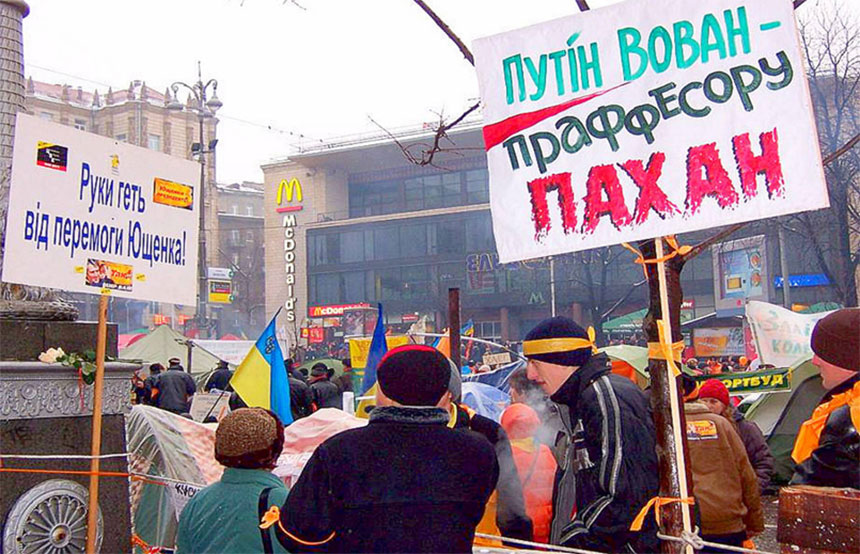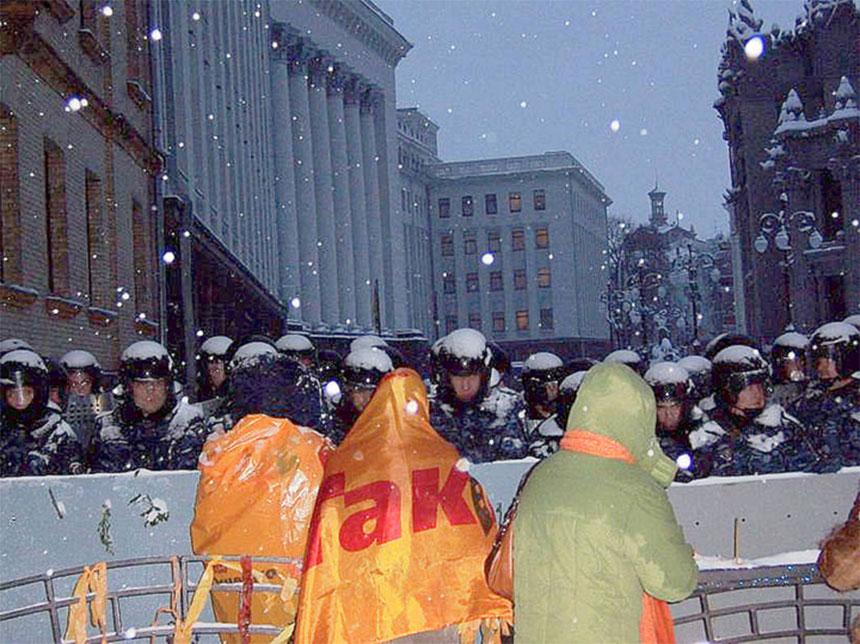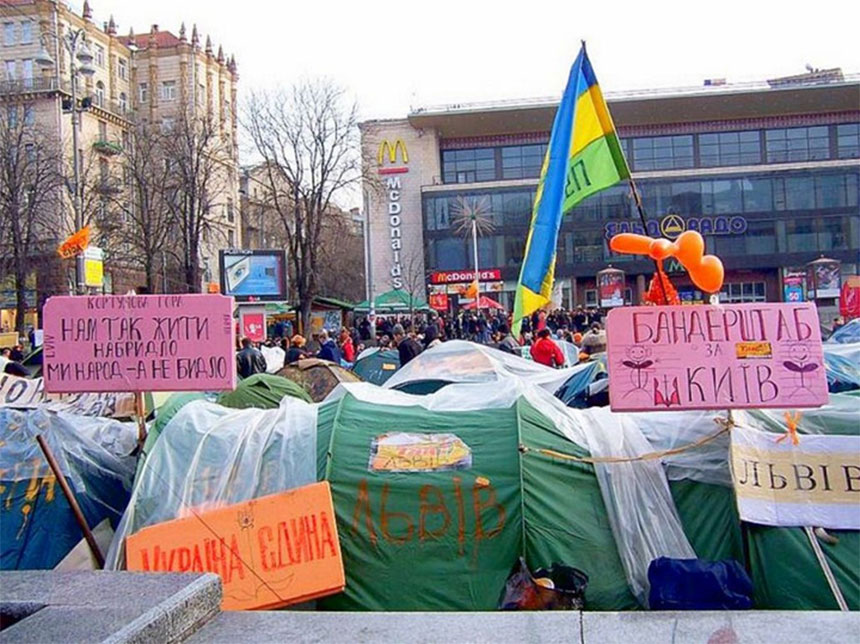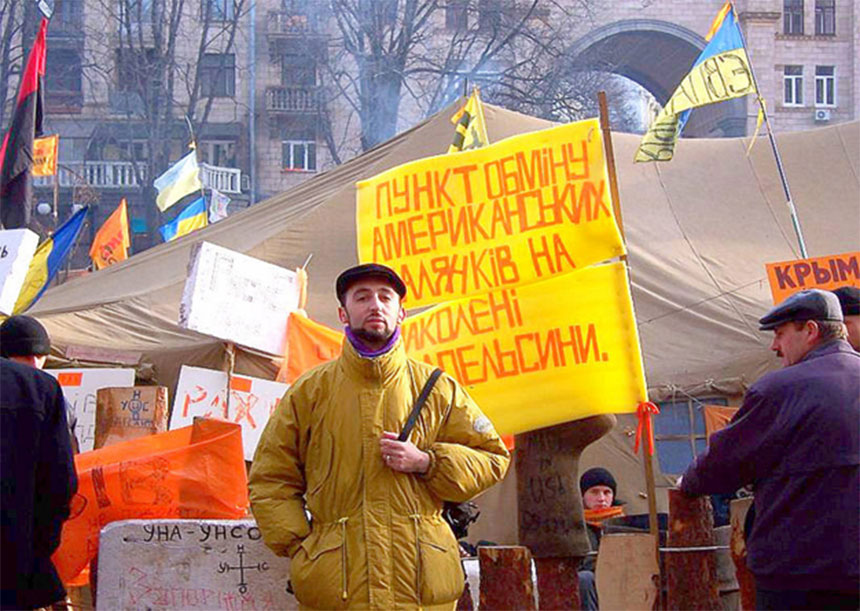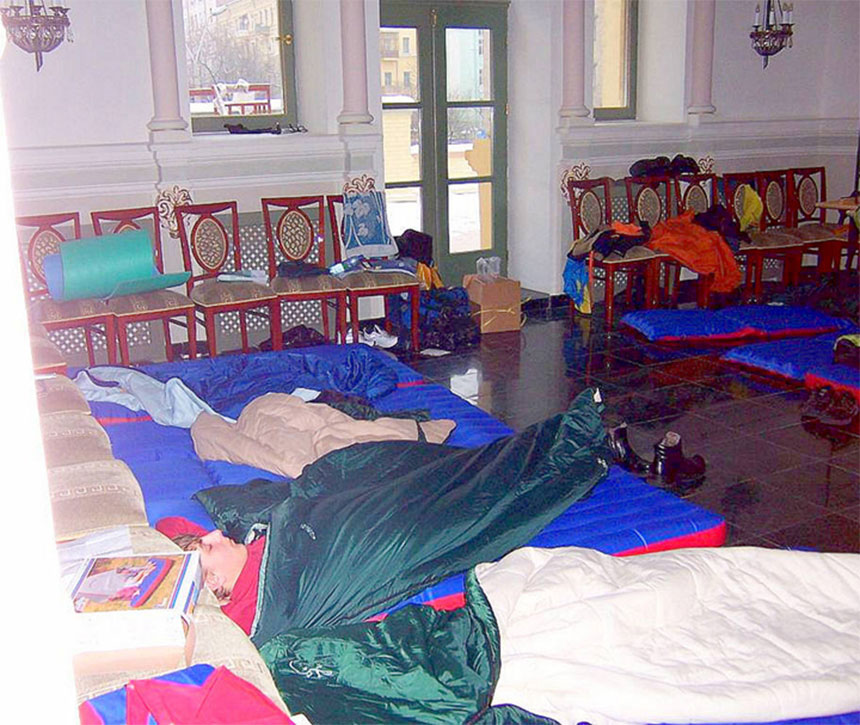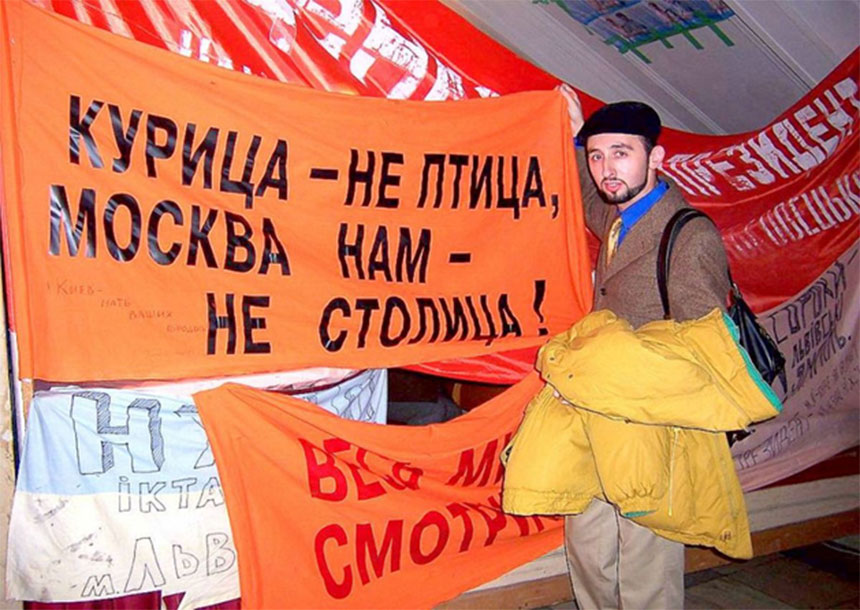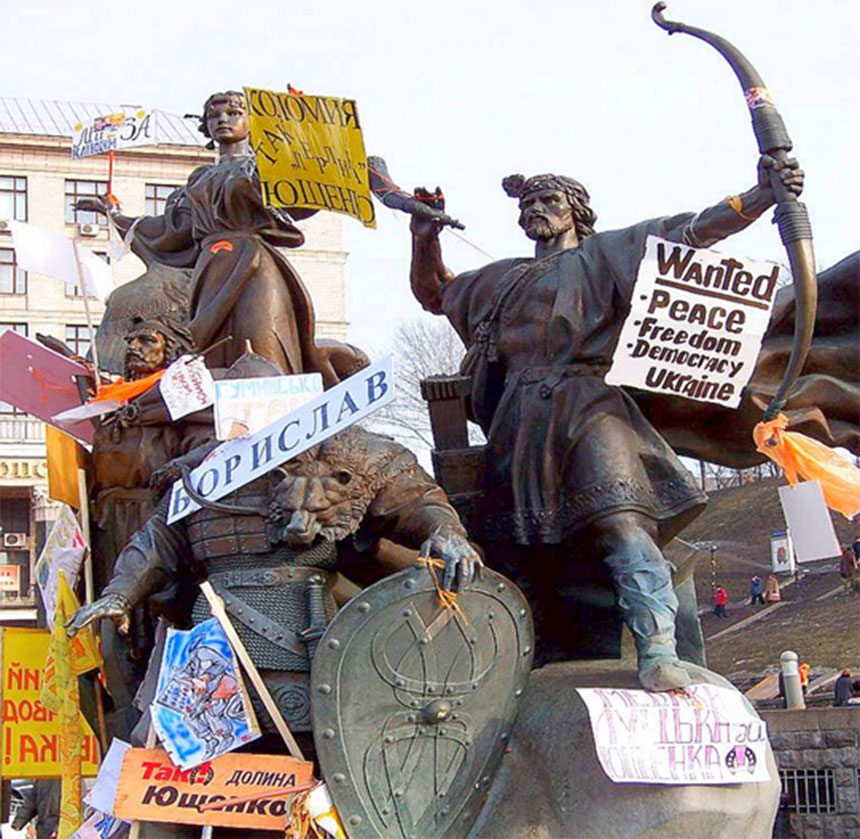Orange Revolution through Israeli eyes
In November–December 2004, as an Israeli journalist, I was in Kyiv on the eve of the Ukrainian presidential elections. I found myself in the epicenter of the Orange Revolution, which was unfolding before my eyes
The Orange Coup
On 20 November 2004, the day before the Ukrainian presidential elections, I saw how quiet and clean Kyiv turned white with the first snow. On the night of 6 December, I left the Ukrainian capital, which was starkly different —chaotic, orange, and snowless. The snow partly melted in above-zero temperatures and was trampled underfoot by millions of people in the center.
The crowd gathered on Khreshchatyk Street on the evening of 22 November. The excited mass of people charged everything with its vibe, attracting more human streams flowing to Independence Square. Should I go and see what's happening there or go home and watch it on TV?
I check my Israeli passport in my breast pocket: if anything happens, it'll help me. I feel fear, excitement, ominous forebodings, and contagious joy from smiling faces. What are you people rejoicing at? Why are you putting on these bright orange ribbons? [Victor] Yushchenko stands no chance. The Central Election Commission has processed three-quarters of the ballots, and all channels leaked information about [Viktor] Yanukovych's victory.
Young people pass by, taking quick steps; the glasses of intellectuals gleam under the streetlights; respectable old couples in solid sheepskin coats try to keep in step. To the Maidan, to the Maidan! The stadium-like slogan "Yu-shchen-koooo!" is already thundering there, and angry fists are raised.
Activists from Yushchenko's camp arrive, throwing orange handkerchiefs into the sea of people. Dozens of hands reach out; hundreds of fingers make grasping movements. The whirlwind of orange fabric sucks me in, too. I stretch out my hand and immediately receive a pack of orange kerchiefs.
I go to the middle of Khreshchatyk, examining my newly acquired gifts. I have no use for so many scarves, so I offer them to people hurrying past me. Some 50 passers-by are heading toward me. "Give me one, give me one, please!" If only these Kyivites knew that the person handing out Yushchenko's free merch to them was a citizen of Israel!
Within an hour, Khreshchatyk turns from a luxurious street with the most expensive boutiques into an encampment. Tourist gear is prepared in advance, and tents spring up in neat rows where you couldn't find a parking place for five minutes the day before. Trucks bring boards and park benches, and barricades rise around the tent island.
Orange anarchy
Where are the police? Why aren't they clearing Kyiv's "golden mile" of invaders? Neither traffic police nor special forces are anywhere to be seen.
There is no government at all. Who is running Kyiv, anyway? A day passes, then another, and the entire capital is ablaze with orange. Up to a million people gather on and around the Maidan on 23–24 November. The ocean of people sways and roars, "Yes!" welcoming the leaders.
The complete collapse of President Leonid Kuchma's regime is in the air. The outgoing president does not appear publicly, and the army and the Ministry of Internal Affairs do not carry out anyone's orders. The government is non-existent. TV channels convey panic on the gray faces of top leadership. There is paralysis of power and determined energy among opposition leaders. It's a revolution!
The presidential administration on Bankova Street is blocked by a crowd of people. I approach the last OMON cordon in front of the building. Shields and helmets in metal ranks, a squad of robots with fear in their eyes. Girls in orange run up to them and tie bright orange ribbons to their silvery shields.
Thousands of people stand under the falling snow, looking at the presidential lair like hungry wolves at a warm sheepfold. No one dares to make the first move. The special forces rearrange the ranks, banging their shields; the crowd prays with the priest, asking them not to go against their own.
The vast masses in the squares and streets of central Kyiv are excited but not aggressive. I hear laughter, songs, jokes, and speeches against Yanukovych and Kuchma. Waves of people flow from Maidan to Bankova Street and back to Khreshchatyk, swirling around the National Bank and completing the circle next to the Verkhovna Rada. Orange streams block the parliament and government buildings.
Yushchenko's supporters follow an original scenario: seizing power through a peaceful, non-violent blockade of key facilities. No fights or clashes — just 50,000 enthusiastic students and citizens who come and block all entrances and exits of the huge Cabinet of Ministers building.
Orange Yulia
Hundreds of thousands of people who have come to the Maidan have their favorites. As a wild beast growling affectionately before its trainer, the Maidan community joyfully reacts to Yushchenko's associates. But the leading heartthrob is Yulia Tymoshenko, the Valkyrie of the Orange Revolution, former Vice Prime Minister, and "gas lady" who has criminal cases opened against her.
The Maidan roars joyfully when the smart, beautiful, and angry Yulia approaches the microphone. She opens her mouth and sinks her sharp teeth into Yanukovych and Kuchma. The crowd hangs on every word. A brilliant speaker, she manipulates the gigantic sea of people like a group of obedient schoolchildren. "Tomorrow, we will all stand near the Verkhovna Rada! Can we do it?" "Yes!" the crowd chants. "We must block the entrances to Kuchma's administration and the Cabinet! Are you with me?" The resounding response is "Yes!"
Orange humor
The main joke of the uprising refers to the Soviet cartoon about Leopold the Cat. Yanukovych blamed Yushchenko for wanting to seize power by force, hypocritically inviting him to "live as friends," a phrase Leopold the Cat repeatedly uses in the cartoon. That same evening, Tymoshenko exposes Yanukovych's ignorance of children's animation: "He forgot who did all the nasty things to Leopold the Cat. Those were two mice, one big and gray and the other small and red!" [These characters easily evoke the images of Yanukovych and Kuchma. – Transl.] The half-million-strong crowd on the Maidan roars with laughter: no one has ever aimed such a smart barb at these two figures.
The revolution in Ukraine is being made with crude humor, beautiful songs, and lively inscriptions. The authorities are gray and gloomy, and the eastern regions' leaders are dull and slow. Meanwhile, the opposition is mobile, cheerful, and mischievous. A government unable to produce cheerful messages and engage in self-irony is doomed. A complete defeat of the government on the laughter front.
It is rumored in Donetsk that Yushchenko's oranges on Khreshchatyk contain injected American drugs. Tent inhabitants immediately turn the rumor into laughing stock as they start posing for TV cameras holding oranges with syringes stuck into them.
[Serhii] Kivalov, the head of the Central Election Commission, declares Yanukovych the winner of the elections. The opposition taunts him by playing on his last name, suggesting that the count is rigged.Portable toilets have been set up along Khreshchatyk. "Yanukovych's office," reads the inscription made by a marker on one of them. The dirty rear window of a minibus from Lviv carries this ad: "I will buy Yanukovych's skin."
The metro is buzzing with chants, such as "Yushchenko, yes! Yanukovych an asshole!" The overall atmosphere is one of a disobedience feast. A drunken teenager stands on the metro platform yelling: "Yanukovych is holubyi; he will make Putin's wife!" [Play on words. The Ukrainian holubyi can mean 'blue,' one of Yanukovych's campaign colors, and 'a gay person.' — Transl.] A student shouts on the escalator: "Yushchenko president, Yanukovych impotent!" Two kids, aged 7-8, happily pick up the chant, which rhymes nicely in Ukrainian, until their mothers put their hands over their mouths.
Orange economy
The first days of the popular uprising are imbued with joy. Kyivites suddenly stand upright and remember Kuchma's sins over his decade-long rule. Now there is freedom! Let's make Yushchenko president, and universal happiness will begin! The old dragon has fallen; long live the orange era of liberty and prosperity.
The clear horizon is obscured by the exhaust fumes from hundreds of buses that have come to the capital from the Carpathians. Khreshchatyk has turned into a mash of dirty snow and waste.
Three presidents have emerged in the country: one paralyzed by fear, another recognized by the Central Election Commission and the eastern regions, and the third sworn in with his left hand on the Bible and his right leaning on Galicia. Tensions immediately rise after Donetsk, Luhansk, and Kharkiv threaten to begin autonomous navigation.
The most astute people start buying pasta, canned goods, and sugar on 25 November. On 26 November, the hryvnia exchange rate wavers. One of the best achievements of the Kuchma era was the stability of the national currency: the exchange rate was UAH 5.25–5.35 per US dollar for five years. Now, it has jumped to 5.41 and stopped. This is not because the financial situation has calmed down. Quite on the contrary, it was simply impossible to buy dollars.
On 1 December, you would have to pay six hryvnias for a dollar on the Odesa black market in the morning and seven by the time evening rolls around. In Kyiv, ATMs are temporarily closed, and you can't withdraw cash using credit cards.
It turns out that the stability everyone in Ukraine has become used to is equivalent to billions of dollars. The post-election chaos has deprived the country of this foundation. When the South and East, which voted for Yanukovych, provide 70 percent of the country's GDP, it is dangerous to insult them. The conflict between the East and the West can have a devastating effect on Ukraine's economy.
Orange Synagogue
How can there be a revolution without Jews? The bosses of local Jewish organizations agreed before the elections that they would not openly support any of the presidential candidates. However, it was known that the sponsors of the Kyiv synagogue in Podil on Shchekavytska Street donated to Yanukovych's campaign. In contrast, the sponsors of the Brodsky synagogue on Shota Rustaveli Street contributed to Yushchenko's campaign.
I imagine this funny scene when prayers in the two synagogues are offered for different candidates. Could it be that the Jews have confused the Almighty with their contradictory requests?
As I sit at the Shabbat table at a Jewish seminar, my rotund neighbor, who has come from Donetsk, says, consuming his third portion of meat and potatoes: "While I'm here with you doing nothing, I could earn $60 in two days. Yanukovych's campaign headquarters pays well for street activities." A Jew from Kyiv responds: "The owner of our confectionery factory [Petro Poroshenko. — Sh.B.] let everyone go to the Maidan without withholding pay for the working days. This is because he is Yushchenko's right-hand man."
A bearded kashrut inspector comes to my Hanukkah lesson wearing an orange armband with the "Yes! Yushchenko" print. I ask him why he supports the orange revolutionaries. "Simply because I don't like bandits," he replies.
On 25 November, 300 meters from the bustling Maidan, I attended the "Jewish Songs About the Main Things" concert in the House of Culture that belongs to — surprise! — the Security Service of Ukraine.
The Brodsky Synagogue, a stronghold of Kyiv's Chabad, spent 25,000 USD delivering food and warm clothes to protesters on Khreshchatyk. Almost 150 orange revolutionaries from the western regions are lodged in the synagogue. The Simkha wedding hall on the second floor has been repurposed as sleeping quarters for Yushchenko supporters. Black socks are hung on the radiators on the women's balcony. The guests behave quietly, carefully eating kosher food in the synagogue dining room. (Someone broke a glass in the building, so what?)
Surreal as they may seem, these are real scenes from today's Kyiv. In two Jewish communities, I am told in great secrecy that Tymoshenko has Jewish roots. No surprise. If an orange synagogue helps the rebels, why shouldn't a politician who has a Jewish grandfather lead the Ukrainian national movement?
A few years later, I learned that in the decisive days of late November 2004, Kuchma's son-in-law, Viktor Pinchuk, urgently flew from Dnipropetrovsk to Kyiv, bringing along Rabbi Shmuel Kaminetsky. Kuchma consulted with both of them about what course of action to adopt amidst mass protests: use force to disperse the riots or step down peacefully. It was the third or the fourth day of the Maidan when the situation could sway in any direction. Rabbi Shmuel strongly advised Kuchma against the use of force or bloodshed so that he would remain in people's memory free of such a bloody stain. Kuchma heeded the advice. In a later interview, Kaminetsky called the ex-president a wise man.
The rabbi's advice not to shoot at peaceful people could have been the most important "Jewish contribution" to the modern history of Ukraine, which remains unknown to the public at large.
Orange palace
I buy a ticket in advance for the play The White Guard by the Moscow Art Theater in Kyiv's October Palace. Anticipating a wonderful encounter with Bulgakov's play, I arrive at the venue on the evening of 4 December 2004: a huge crowd, feverish sparkle in thousands of eyes, and Galician accents spoken by many. The guards at the entrance do not let anyone in.
The performance is canceled because the orange protesters have taken over the palace. They have set up a sleeping area and headquarters there. The Moscow artists have been sent back together with the stage decorations, disrupting their tour. Making my way to the box office, I demand a refund for the ticket.
Thousands of people lie under the vaults of the palace, in the halls, and along the corridors. The smell of unwashed bodies and the heroic looks of history makers. Everyone is kind and friendly. The security guards demand to see my documents. After glancing at my plastic card from the Union of Israeli Journalists, the face of a gloomy orange activist immediately breaks into a friendly smile. A permit is printed, allowing me to take pictures inside the building.
No matter how we assess the events in Kyiv, this is, without doubt, a unique popular movement of peaceful protest. It is a new form of Ukrainian national revival not accompanied (yet!) by any antisemitic actions. Will Yushchenko manage to keep his supporters in line? I don't know, but there is hope.
Text and photo: Shimon Briman (Israel).
First published in Vesti (Israel) on 9 December 2004 and updated in 2024.
Translated from the Ukrainian by Vasyl Starko.







